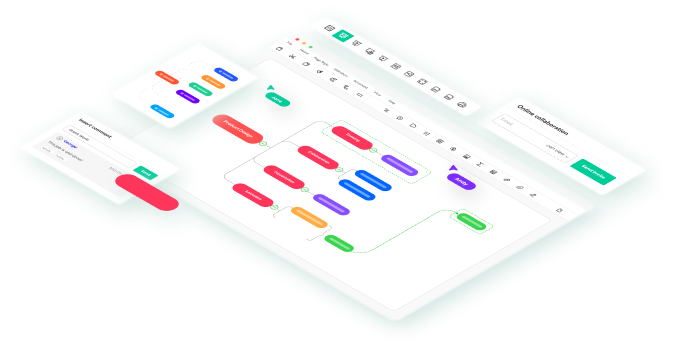Brainstorming is the name of generating a series of ideas to find out the most suitable one. In comparison, brainwriting empowers participants to think outside of the box. This type of brainstorming helps you understand how every team member views the problem. Hence the overall idea-generation process becomes efficient and quick.
In this article, you will learn what precisely brainwriting is, running its successful session, example, and more. If you are looking for a brainstorming tool you can trust, try the AI-powered brainstorming feature of Wondershare EdrawMind.
In this article
What is Brainwriting?

Well, brainwriting is a comparatively rapid process to gather some quality ideas. This technique works in three different phases.
In the first phase, all participants write down their ideas on paper without discussing them with other teammates. Once they document their thoughts, they pass them to other members for review and addition if needed. Lastly, when papers make a full round, all ideas are shared with the team. A whiteboard is often used to share these ideas.
Since all participants write down their ideas before sharing them with other fellows, the anxiety or level of pressure gets significantly reduced. This is why brainwriting generates more ideas compared to face-to-face brainstorming sessions. The larger the number of ideas generated, the brighter will be the chances to highlight highly dependable and applicable solutions to the specific problem.
What Is 6-3-5 Brainwriting and How Is It Different
It is one of the simplest types of brainstorming in writing. In 6-3-5 brainwriting, a group of 6 participants has to document 3 ideas within 5 minutes. You can see these numbers in the name of this technique. After 5 minutes are gone, each participant passes their ideas to the next member and writes 3 more ideas. This is how the process goes on.
6-3-5 brainwriting has 6 rounds. The process continues until every participant receives their original paper. In the end, you will see that 108 ideas are generated and documented on the paper and ready for you to review. If you want to gather ideas from large teams, you can simply break them into small teams of 6 people only. This is where 6-3-5 brainwriting will lend you a helping hand.
In simple words, this type of brainstorming for writing makes ideas generation simple yet effective. If we talk about the key benefits of 6-3-5 brainwriting, it gives all participants a free hand to think and write down their ideas without any criticism or pressure. As a result, the problem of domination gets eliminated. In addition, this technique enables people to become more expressive when documenting their ideas.
Let's look at two more types of brainstorming in writing.
- Online Brainstorming:This method uses a virtual platform to run a brainstorming session to collect the most feasible ideas in the end.
- Collaborative Brainstorming:It is a great alternative to a formal meeting. You can choose an easily accessible space where you and your team can add different ideas.
Brainwriting vs. Brainstorming
Basically, you can do brainstorming for writing an essay, a novel, creative writing, or any other piece of content. Brainstorming has different types, and brainwriting is one of them. Let’s understand the difference between traditional brainstorming and brainwriting.
If your teammates are good at sharing ideas on paper first, brainwriting will be a perfect method to collect worthy ideas. At the same time, if your team is composed of both extroverts and introverts, running a brainwriting session will be an amazing choice.
How to Run a Brainwriting Session
Are you planning to run a successful brainwriting session? Following the five steps listed below will help you get this job done.
1. Appoint a Moderator
A moderator is a person who oversees the whole process of writing down ideas, exchanging worksheets, and sharing ideas in the end. A moderator makes sure that every round or step is being followed correctly to get the maximum out of the running session.
You can run a session without a moderator too, but the chances of mistakes may increase exponentially. This is why taking a trained moderator on board is always recommended.
2. Decide the Number of Participants & Rounds
Determine the number of people who want to participate in the session. Once done, decide how many rounds should be there in the session. There is no particular limit on deciding the number of rounds or people to include in one session. You can go with the current situation accordingly.
3. Start from Round 1
Once you have a specific number of participants and you decide on the number of rounds, the next step is to start the brainwriting session. Start from round 1, where all team members write down their thoughts and ideas on a paper before presenting them in front of other members.
Since they are not supposed to discuss before they write, they think freely because they know that no one is going to criticize them, at least for now.
4. Pass on Worksheets
Once all members document their ideas, every participant shares his or her worksheet with other fellows. The process continues until everyone gets back his or her original paper or worksheet. This is how round 1 gets completed. Other rounds are performed in the same manner. Repeat the same process until you are done with all the rounds.
5. Share & Discuss Ideas
Once all rounds are completed, every participant has to present his or her idea to discuss with others to see how they think about it. This is how everyone shares their written thoughts and continues the discussion to find out the most viable solution to fix a certain problem. When ideas are shared, all members are free to give their suggestions and collectively support the great idea.
An Example of Brainwriting
The diagram shown below presents a snap of a brainwriting session to understand this subject in a better way. As you can see, six different participants have taken part in the session to write and share various ideas. All participants are displayed in the first row with different colors: from dark blue to brown.
The second row displays the ideas presented by six participants. You can see that all members have presented three ideas in total. When refining ideas with healthy discussions, two ideas are suggested for improvement, and you can see them both in the third row. Once they are improved, they will be converted into directly applicable solutions. All brainwriting sessions are run in the same manner, as stated above.
Do you need some worthy assistance in ideation and brainstorming? Searching for some credible tools to act as your helping hand in this regard? Try Wondershare EdrawMind tools. They use the real power of artificial intelligence to provide you with unmatchable experience while running a brainwriting session.
Relevant Topic: 10 Free Brainstorming Example
Conclusion
Brainstorming is an effective approach to collecting unique and innovative ideas from a group of people to solve a specific design problem. As a credible type of brainstorming, brainwriting is a quick way to get refined ideas. It consists of three steps, each having its own importance.
Initially, every team member writes down their thoughts on a piece of paper and passes it to other fellows. This process repeats until all members get their papers back. This is how the first round gets completed. You can do as many rounds as you want to collect a range of ideas.
Once everyone shares his or her input in the written format, the discussion continues to present and discuss all the ideas written on the worksheets. Simply put, you get a decent number of unique ideas and improve them in a short period. If you need a trusted tool to benefit from a brainwriting method, look no further than Wondershare EdrawMind.





 below.
below.  below.
below. 